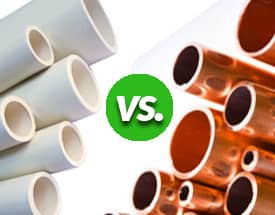Tuesday, December 27th, 2016
ThreadBanger Battle: Copper vs. Plastic Pipe. Who Wins?

Every home or business owner with a plumbing problem eventually arrives at the age-old question: Which is best…copper or one of the plastics (PVC or CPVC)?
According to selfhelpandmore.com, both copper and plastic water pipes have advantages:
Both types of materials are:
• Relatively non-toxic and, most importantly, NOT made of lead
• Corrosion-resistant
• Easy to work with, although copper installations require soldering skills while PVC only requires gluing skills
• Highly durable
• Recyclable, which minimizes environmental impacts
What’s the difference between copper, PVC and CPVC?
• Copper is a naturally-occurring metal that is mined from deep within the earth (THANKS, Made in America!). Copper piping is available in different grades; the better the grade of copper, the more expensive and long-lasting it is. For a quick overview on the different grades of copper and their respective uses, this YouTube video may be helpful: https://www.youtube.com/watch?v=-iz5ezxQ9pA
• CPVC is chlorinated polyvinyl chloride – it is a polymer (a.k.a. plastic) and has greater heat resistance and better impact strength than conventional PVC. CPVC is rated for use on both hot and cold water lines.
• PVC is similar to CPVC, but should only be installed on cold water lines. PVC is not rated for usage as a hot water pipe (additional information is below).
• PVC and CPVC are not “the same thing” and should not be in direct contact with each other. The outside diameter of PVC differs from PVC, which requires different fittings and cements.
Consider Your Application When Choosing Copper or Plastic Pipe
Installation/health concerns — According to Lowes.com, one of the most common consumer concerns with PVC/CPVC are the potential health effects of the glues and the polyvinyl chloride composition of the pipe. But “The Ann Arbor, Mich.-based National Sanitation Foundation (NSF), periodically checks U.S.-manufactured pipe for any objectionable trace chemicals that could get into the drinking water. If there are no trace chemicals, the pipe is certified by NSF.”
Old house cast iron repair jobs — For homeowners faced with repairing vintage cast iron pipes, CPVC is commonly chosen over copper pipe. Why? Because unlike copper, plastic pipe will not corrode when it is in contact with iron pipe. PVC/CPVC is an inexpensive solution to this situation.
How does a Consumer Choose Between Copper or CPVC or PVC?
At the simplest level, the choice depends on the look desired and available budget — copper piping is a classic traditional look and bespeaks the fineskills of a highly trained plumbing professional and knowledgeable consumer. Copper is solid. It lasts for years. In new home construction or higher-end bathroom remodels, copper is a good choice. Copper is also a reliable option for those living in extreme temperatures or in hard water situations.
CPVC and PVC are good choices for DIY repairs or when budget is a major constraint. CPVC and PVC are commonly used in rental properties, hotels, public facilities — areas where usage is high and repairs are frequently needed. It’s important to note that PVC is unreliable as a hot water pipe — it will begin to degrade at hot water temperatures in excess of 140 degrees Farenheit.
Water You Waiting For?
For advice on whether copper, PVC or CPVC pipe is suitable for your plumbing needs (including a whole house repipe, new construction or water line repair), call, or Contact Ray at Allied Reddi-Rooter (513-396-5300). Since 1950, Ray and his team have been leading Cincinnati plumbers in keeping residential and commercial water flowing. Call today! We always come highly recommended and have earned an A+ rating from the Better Business Bureau for our expert quality of service.
